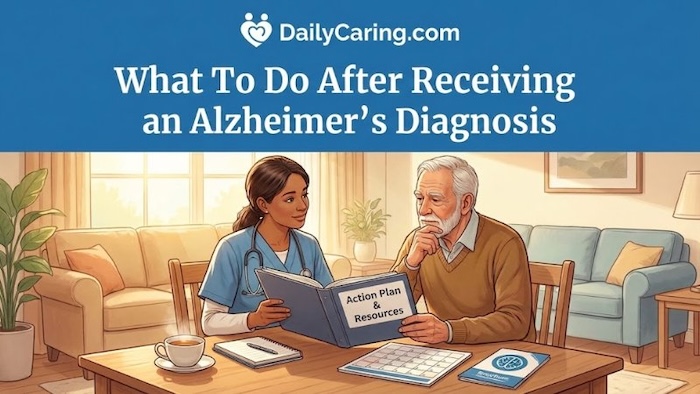Even if you suspected it, receiving an Alzheimer’s diagnosis can be devastating for you and your loved one. It will likely leave you wondering what to do next. Our friends at Kindly Care share wise advice on what to do after a diagnosis.

Quick Start: Your First Steps
An Alzheimer’s diagnosis is a marathon, not a sprint. Focus on these three areas first to stabilize the situation before diving into long-term planning.
| Phase | Focus Area | Key Action |
|---|---|---|
| Immediate | Medical Clarity | Talk to a neurologist to confirm the specific dementia type. |
| Short-term | Legal & Safety | Secure Power of Attorney and do a home safety check. |
| Ongoing | Support | Join an Alzheimer’s support group and delegate roles. |
The Shock of Getting an Alzheimer’s Diagnosis
You just got the news. The doctor said it out loud. The sudden realization that comes when a family hears a dementia or Alzheimer’s diagnosis is often overwhelming.
Friends and relatives are usually aware (sometimes for a long time) that something is wrong, but everything changes when a doctor actually puts it into words.
There are no more rationalizations, the problem can no longer be overlooked, and the patient can no longer just be characterized as “eccentric”. It is at this point that a family needs to unite and take immediate action to ensure their relative’s safety and care, as well as to make plans for the future.
Changes Are Necessary, But Oftentimes Difficult to Make
A lot of changes will be taking place, and while none of them will be easy, being prepared is essential to surviving this period as sanely as possible.
It’s important to know what to expect as the disease progresses, as well as how to maintain your own health and family relationships. Also, in spite of everyone’s good intentions, things don’t always run smoothly.
The person who agrees there needs a Power of Attorney or says they will accept bill-paying help might suddenly balk at the idea once there is an appointment with the lawyer, or they may start hiding invoices rather than allowing assistance.
The logical response of allowing a caregiver to help can suddenly change when they appear at the door. More than one caregiver has been told by a family member that mom or dad sent them away, saying that “their services were not needed.”
20 Steps to Create a Long-Term Plan Following a Dementia Diagnosis
Getting organized and creating a long-term plan (and sticking to it as best as possible) will help make the process more manageable. Involve the person with dementia whenever possible and encourage them to participate.
1. Talk to a neurologist
Do not just accept an offhand “Mom’s got a touch of Alzheimer’s “ or “it looks like dementia” from a primary care physician as a certain diagnosis. Ask for a referral to a neurologist for an in-depth and possibly more specific evaluation and diagnosis.
Other conditions can mimic dementia. One example is depression. Also, medications can sometimes cause similar symptoms to thyroid disorders.
A neurologist may be able to further define what type of dementia your loved one is experiencing, helping you to understand what changes to expect.
2. Discuss the diagnosis
Bring it out in the open and let close family members know what is happening so they can provide support and help maintain your loved one’s well-being.
While this may seem like an invasion of the individual’s privacy, it can provide a safety net, encouraging friends and family to check on them and ensuring they are not preyed upon by the unscrupulous.
3. Start your planning now
Identify both the immediate and long-term needs. It is so important to look beyond the immediate and plan for the progression of the disease.
The motivation to take care of the “now” can dissipate, leaving family members floundering a year or two down the road. What type of care may be needed? Is the current living situation safe and accessible? Are useful resources available? Do they have adequate finances to cover any assistance they might need in the future?
4. Consider working with a Geriatric Care Manager
Many families hire a professional geriatric care manager (either for a one-time consultation or long term) to create an ongoing care plan, direct the family toward resources, and sometimes even act as a mediator between the family and the patient.
This is often less stressful because a professional does not have the emotional connection that the family has and can remain objective. They can evaluate the situation professionally and non-judgmentally.
Also, the ability to access and navigate resources more quickly will often make the service cost-effective.
5. Get help from other family members
Designate how care and other assistance might be divided. Who can take Mom shopping or accompany her to medical appointments? Who will pay bills and handle finances?
Those unable to provide a physical presence should also be encouraged to contribute. A son residing in another country might be able to provide some help via a grandchild, or can be asked to contribute financially.
Equally, providing help in one form or another will often eliminate resentment between family members in the future.
6. Have a backup plan
Consider what might happen if the primary caregiver should become incapacitated. Is there a backup plan if Dad gets sick and can no longer supervise Mom? Do some research on home care agencies or facilities offering respite care.
7. Monitor physical condition
Is Mom or Dad losing weight? Is their nutrition adequate? Check the refrigerator and find out what they are actually eating. Many seniors skip meals because it is just too much effort to cook, or substitute meals with low-nutrition snack items. Is cooking still safe?
Knowing When to Step In
It can be difficult to tell when a loved one has crossed the line from “having a bad day” to needing active intervention. Use this comparison to help gauge their current needs.
| Situation | Manageable | Action Required |
|---|---|---|
| Nutrition | Occasional frozen dinner. | Expired food in fridge; noticeable weight loss. |
| Finances | Misplaced a single utility bill. | Hiding stacks of unpaid invoices or “secret” spending. |
| Cognition | Forgets where the car keys are. | Forgets what the keys are actually for. |
8. Check to make sure bills are being paid
Locate and organize invoices and be aware of recurring payments. Many utility companies have programs that allow a family member (when authorized by the customer) to access payment information or be called if a payment is missed.
Set a day/time where you can sit down with your parent to help them pay bills. Make sure they get mailed out. More than one person has found unmailed checks sitting in a drawer while bills go overdue.
9. Sort out the legal homework
Legal documents should be located and verified, and an attorney should be consulted regarding a Power of Attorney for Health Care and Finances.
A copy of the Health Care proxy should be given to the primary care physician. (Keep a copy on your phone as well as a copy of your parents’ medical insurance card) Have your loved one sign a HIPAA release so you can access medical providers. Some offices will not even confirm appointments without this.
Locate insurance policies and check for long term care coverage.
💡 Perspective Shift:
When a loved one “balks” at help, it is usually fear of losing independence, not stubbornness. Instead of saying “You need help with bills,” try “I want to help you protect your legacy so we don't have to worry about the bank.”
10. Are the individual’s wishes known regarding funeral arrangements?
If this is too uncomfortable, perhaps the family attorney or a care manager can help identify them. Family members can then ensure they adhere to.
11. Keep aware of all medical conditions
Is mom maintaining the appropriate diet for a diabetic? Is Dad using his walker as directed? Are they capable of successfully managing a condition or process appropriately (i.e., a colostomy)?
This is important, as people often insist they are in control (until a medical crisis occurs).
12. Maintain a list of all medications
Ensure that they are being taken appropriately. Medisets (compartmented pill boxes with days listed) are a visual reminder for daily medication.
Assign a family member to fill the boxes and maintain the medication supply. Double-check the prescription list with the Doctor’s office. Check the medicine cabinet and dispose of all expired medications or those prescribed for conditions that no longer need treatment.
13. Do a safety check
Make sure there is adequate lighting, no loose rugs, secure locks on doors, and that the telephone is programmed with emergency numbers.
Also, keep a list of emergency numbers visible that identifies who the person is (i.e., “Mary — John’s daughter who lives next door”). Consider a personal communication/emergency device.
Before leaving a loved one alone, ensure all stove knobs are secured and emergency numbers are taped directly to the refrigerator in large, high-contrast print. Small details prevent major crises.
14. Discover the individual’s sleep patterns
Are they safe alone at night? Is the bathroom safe, well-lit, with grab bars and non-slip surfaces? Can they still bathe alone safely? As an extra precaution, can bathing be arranged while a family member is in the house (i.e., while putting away groceries)?
15. Be prepared for an emergency
Maintain a notebook that documents medical conditions and incidents, lists medical providers and phone numbers, insurance cards, and copies of identification cards. Include your parents’ date of birth and have access to their Social Security number.
16. Plan social and physical activities
Arrange for safe exercise and activities, such as walking and senior programs. Walking in the park with mom is a great way to spend quality time.
17. Ensure the family pet is being taken care of
Can dog walking become a regular supervised exercise? A neighborhood youngster might be willing to walk the dog, make sure he has food and water, and contact you if there is a problem.
Caring for a pet can be inconvenient, but ending that relationship by removing an animal can be extremely traumatic to a senior.
18. Keep your loved one busy
Boredom can lead to depression or anxiety. Create ways to continue engaging and stimulating the individual. Create a “collection” and add to it regularly. Dollar Stores, Goodwill, and even yard sales are good sources for such items.
Puzzles, brain teasers, simple electronic games such as Simon, craft projects, sing-along music, and trivia games are possibilities. These can also provide activities for you and your loved one to do during visits.
19. Locate and utilize Alzheimer’s resources
Even if your family member has been diagnosed with a dementia other than Alzheimer’s, organizations like Alzheimer’s Association are a wonderful resource for programs, services, and activities.
Take advantage of family/caregiver support groups, read about the illness, and stay informed.
20. Learn to Ask for Help
Many caregivers find asking for help extremely difficult for a variety of reasons. They feel guilty, believe others might think they “don’t care enough”, feel others might see them as lazy or incompetent, and may think it looks like they are avoiding their responsibility.
Not only is it important that you take care of your own health and well-being first, but often a break can help you change your perspective on a situation before things become overwhelming.
Make a list of what kinds of help you need: a “sitter” so you can go shopping or take a walk, someone to help clean or cook, or someone to just have conversations with. When someone asks, “What can I do to help?” you should always have an answer from that list.
📋 Take This to the Doctor
When you visit the neurologist (Step #1), use these questions to ensure you get the clarity your family needs.
| Question to Ask | Why it Matters |
|---|---|
| “Is this Alzheimer's or another form of dementia?” | Different types (Vascular, Lewy Body) require different care strategies. |
| “What stage is my loved one currently in?” | Helps you anticipate symptoms for the next 6-12 months. |
| “Which medications are for symptoms vs. disease progression?” | Ensures you understand the goal of the prescription (Step #12). |
VIDEO: What To Do After Receiving an Alzheimer's Disease Diagnosis
The Power of a Shared Laugh
Caregiving is a heavy mantle, but you are allowed, and encouraged, to find the light in the absurdity of certain situations.
“One day Mom insisted the cat was a Russian spy. Instead of arguing, we just agreed the cat looked suspicious and gave him a ‘security clearance' treat. Sometimes you have to laugh to keep from crying—humor isn't a sign of disrespect; it's a vital reset button for your brain.”
🤝 Trusted Support Resources
You don't have to navigate this journey alone. These organizations offer specialized tools, helplines, and community support for every stage of dementia.
| Organization | Best For… |
|---|---|
| Alzheimer's Association | 24/7 Helpline, local support groups, and the latest clinical research. |
| Family Caregiver Alliance | Practical caregiving skills, fact sheets, and state-by-state resource locators. |
| Alzheimer’s Foundation of America | Hands-on care information and “Teal Card” emergency identification tools. |
| DailyCaring Community | Practical daily tips and a community of peers who truly understand the journey. |
Final Thoughts: Nobody Is Perfect, Just Do Your Best
The above information is intended only as a guide. Every individual and every family is different. We all have different expectations, and caring for an aging parent can be a very emotional and frustrating task. We really don’t expect that role reversal.
It is important to maintain your own physical health and mental state. Keep a sense of humor. It really is okay to find the humor in situations as you go on this journey. Take a deep breath, take a break, and even if you think you don’t need it, put yourself first.
Airline crews always remind us when traveling with children to put our own oxygen mask on first in an emergency. This is good advice to take to heart. Remember, no one is perfect, and doing your best is really all you can do.
You might also like:
— What’s the Difference Between Alzheimer's and Dementia?
— 6 Essential Alzheimer’s Care Tips
— Alzheimer’s Support Group on Facebook: Memory People
Guest contributor: Susan M Anderson, MHS, CMC, is a certified Geriatric Care Manager with 20+ years of experience. Now semi-retired and writing for Kindly Care, a care management platform for peer-to-peer caregiving.
About the Author

Chris is a seasoned healthcare executive and entrepreneur from the Pacific Northwest. He strongly advocates for older adults and the caregivers who serve them. Chris has personal experience caring for his father, who had dementia. Chris is an avid outdoorsman; if he's not in his office, he can usually be found on a golf course or in a garden out west somewhere.













